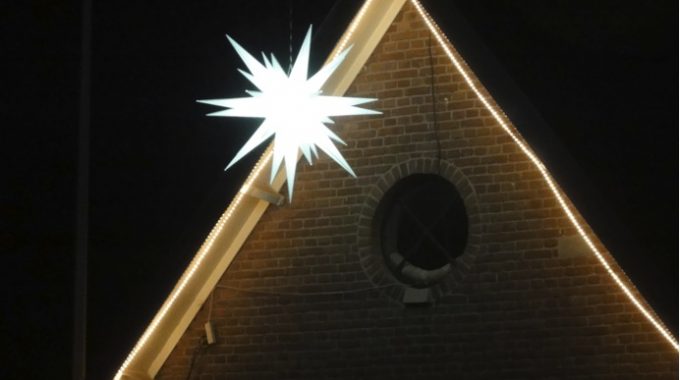
Time to shine
Stars, in case you haven’t noticed, are really ‘in’ right now. Usually we talk of stars coming ‘out’ but at Christmas they are really ‘in’–as street decorations, atop Christmas trees, in shop windows and on Christmas cards.
Especially those cards with the Wise Men following the star to Bethlehem, stopping over the stable where Jesus lay.
Now, how irrational is that? There are shooting stars and satellites that look like stars. But stars don’t just move slowly across the skyline and stop over individual houses! That sounds more like a UFO!
Irrational it is and I simply don’t have an explanation. But the human fascination for stars, especially in this season, is also irrational. No more irrational, however, than the universal longing for meaning, spirituality, justice, beauty, freedom and the harmony of right relationships. None of these values can be fully rationalised yet they resonate in each human heart. We know somehow that they belong to ultimate and eternal realities.
Christmas is a season about values and the restoration of something fundamental lost back in time. And the star seems to be the appropriate symbol of hope for recovery.
Rationally seen, a star is simply a ball of fire incredibly far off. In fact, that point of light we see as we look up into the night sky is not where the star is now; it’s where it was umpteen years ago when the light rays now reaching us left on their long journey. Scientifically there’s no basis of hope in that.
Wonder
Yet stars have always inspired wonder and hope. As toddlers we sang, ‘twinkle, twinkle, little star, how I wonder what you are…’ Long ago our ancestors thought our fate was determined by the stars. More and more people seem to be returning to that belief these days.
Even in atheistic circles, the star has been a symbol of inspiration. Soviet architecture was invariably topped by a great red star, the symbol of revolution.
Think of how many flags display stars: the American flag, the European flag, the Chinese flag, many African and Latin American flags, those of Australia, New Zealand and many Pacific Islands.
Against all reason, the star remains a universal symbol of hope and aspiration. One of Vincent van Gogh’s most famous works, Starry Night, expresses his own spiritual journey from darkness and hypocrisy in his own experience of the Dutch church to his encounter with God in nature, writes Kathleen Erickson. (see footnote)
Van Gogh himself found hope and comfort in the stars. “When all sounds cease, God’s voice is heard under the stars”, he once wrote. In a letter to his brother Theo, he referred to the constellations of the night sky as speaking of “the love of God and make one think of the words, ‘Lo, I am with you always, even unto the end of the world’.”
Geometry
My favourite star comes from Herrnhut, where hand-made paper stars were first developed by a school teacher to help his students learn geometrical shapes. For over thirty years we have had a family tradition of assembling our 32-point Herrnhut star. Technically the geometrical form is a great stellated dodecahedron. It’s great because the isosceles points are tall; the shorter version is called a small stellated dodecahedron. Of course, you knew all that. This is important to know because when your 6-year old asks, “Daddy, can we make a great stellated dodecahedron again this Christmas?”, you know what she’s talking about.
This Christmas, we have a really great outdoor stellated dodecahedron from Herrnhut hanging from the highest point of Centrum ‘s Heerenhof, a gift from the Jahu Fellowship in Biel. Illuminated by a low-energy bulb, the star remains on day and night but only shines when it gets dark. That’s the interesting thing about stars.
And there’s a message of hope for us all at the end of 2012. In Holland, we have seen a new government formed that seems intent on further eroding the remaining Christian values in society. The last act of parliament this year was to scrap the ‘Sunday rest’ law. Other new laws this year forbid the conscientious objection of civil servants to conducting same-sex marriages, enforce the teaching of homosexuality in schools as normal, promote euthanasia and ban the broadcasting of church services from public broadcasting.
This promises darker times ahead for Christians in Holland. Yet Paul urged the Philippians in their pagan society to ‘shine like stars‘ among a warped and crooked generation (Phil. 2:15).
It’s time to shine.
Till next year,
Jeff Fountain
1 At Eternity’s Gate, Kathleen Powers Erickson, 1998, Eerdmans

This Post Has 0 Comments